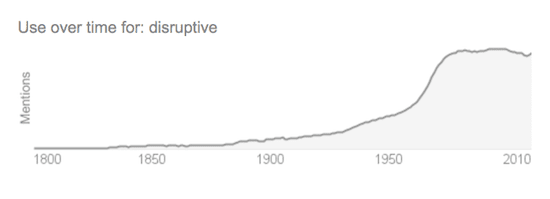A lot of conferences, books and businesses are talking about disruption. With so much banter, it’s hard to get to the bottom line truth about disruption. On Google, there are now 43.4 million search results for the term, with some massive spikes over the last 10 years. The graph below shows how the word is trending slightly higher over the last couple of years.
But you can’t trust Google on these matters. Turns out that the bulk of the “disruption” relates to travel-related interruptions.
Disruptive business
The trend is distinctly more “hot” when it comes to “disruptive innovation” or “disruptive business.”
People around the world — and in many executive board rooms — are waking to the realization that disruption will not only happen to others. However, the truth is that disruption as a term is being completely banalized, distorted and even vilified. Anything and everything is being called disruptive. It’s especially attractive to add to a red-herring prospectus ahead of fund raising.
The undeniable role of technology
Using Google’s powerful database, you can see that over the course of “time”, the words disruption or disruptive have been used much more since the 20th century. My hypothesis would be that the usage is intimately linked to the different technological advancements. Even if this graph by Google shows a tailing off just now, I think that the disruptive effects of the new world order — including new technologies not yet invented — are only just beginning.

The trouble with disruption
The biggest trouble with the way the word is being used in business is that it is being hooked to the “uberization” phenomenon. It’s all about the unicorns that are revolutionizing business. Some companies are wanting to reproduce the Uber or Airbnb effect. Others are bravely running after their very own version. But many (a majority?) of the traditional businesses are striking a defensive posture, trying to consider how to fight off the trend. The major error is looking at this disruption as essentially technology-driven play.
The truth about disruption
If there are many extraordinary technological advancements that are driving and or empowering the change, the truth is that disruption is happening in conjunction with a sea change (literally) in mindset. Share on X It is not without coincidence that the beginnings of the Arpanet and Silicon Valley are both in San Francisco — which was also the birthplace of the hippy movement. There is a new attitude that is, in its turn, empowering the technologies to help uproot traditional business and transform business models. Prime among these mindset changes are the following:
- climate change (requiring action rather than just words)
- sharing (whose fundamental currency is trust)
- meaningfulness (looking for de facto purpose)
- diversity (in outlook as much as in origin/sex/race)
Business executives need to pay as much attention to the mindset in order better to capitalize on these outstanding technologies.
Your thoughts?










